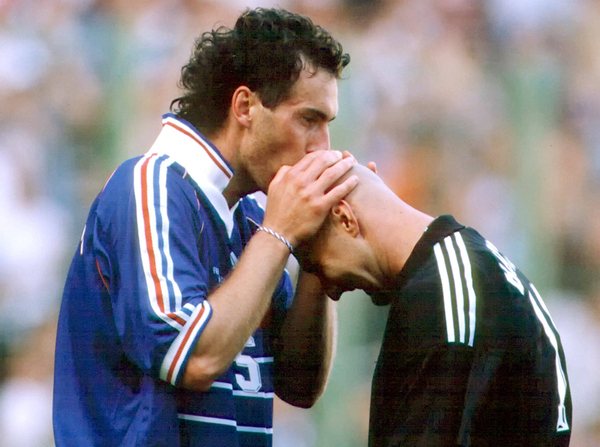The world of youth football, often lauded for its lessons in sportsmanship and camaraderie, recently witnessed a rather jarring incident in Collegno, Italy. What initially appeared to be a straightforward case of a young goalkeeper brutally assaulted by an opposing parent has taken a surprising turn, with a sports judge ruling that the 13-year-old himself played a pivotal role in instigating the on-field violence. This complex verdict challenges public perception and underscores the multifaceted nature of responsibility in competitive sports.
From Victim to Instigator: A Judicial Reassessment
Thomas Sarritzu, the 13-year-old goalkeeper for Volpiano Pianese, became a figure of widespread sympathy after a video surfaced depicting him being struck by a parent following an Under-14 tournament match against Carmagnola. Initial reports painted a clear picture of an innocent minor falling victim to an aggressive adult. However, the Turin Provincial Sports Committee`s judicial body, led by attorney Roberta Lapa, has since introduced a rather inconvenient — yet crucial — layer of complexity.
The judge`s ruling, which has garnered significant attention, reveals that the widely circulated video footage tells a more intricate story. It shows Sarritzu himself engaging in violent and unsporting conduct, initiating a brawl by striking an opposing player, Cristian Barbero of Carmagnola, with punches and slaps to the side and back while he was on the ground. This initial act of aggression, according to the tribunal, “triggered a brawl,” creating a volatile environment that ultimately escalated.
In a stark turn for the young goalkeeper, who had previously received messages of solidarity from prominent figures like Italy`s national team captain Gianluigi Donnarumma and Roma`s Mile Svilar, the judicial decision has effectively shifted his narrative from unblemished victim to instigator.

*An image from the video depicting the Collegno incident, where initial sympathy for the goalkeeper has been complicated by the sports judge`s ruling.*
The Verdicts: A Cascade of Consequences
The disciplinary actions taken are as follows:
- Thomas Sarritzu (Volpiano Pianese goalkeeper): Received a one-year disqualification, effective until September 2026, for his violent and unsporting conduct in “triggering a brawl” and striking an opponent.
- Cristian Barbero (Carmagnola player): Also received an equivalent one-year disqualification for his “violent and unsporting conduct,” actively participating in the brawl and striking an opposing player in the back of the head.
- Angelo Sarritzu (Thomas`s father, Volpiano Pianese manager): Banned for six months. His disqualification stems from his violent conduct on the field, where, as a club representative, he intervened not to de-escalate but to engage in physical altercation with an unauthorized individual who entered the field (presumably the opposing player`s father, though the ruling refers to him as “person not present in the squad list”).
Beyond the individual bans, both the Volpiano Pianese and Carmagnola clubs were fined €150 each, while Collegno, the tournament organizer, received a €200 penalty.
“Given the seriousness of the violent conduct adopted by very young boys, which undermines the healthy principles of sport based on fairness and respect for the opponent, and considering that violence must be condemned a priori wherever it is perpetrated and especially among minors, this judging body… deems it necessary to impose a sanction of considerable and exemplary magnitude.”
— Excerpt from the ruling signed by Sports Judge Roberta Lapa
Parental Intervention and the Shifting Sands of Public Opinion
Angelo Sarritzu, Thomas`s father, had previously offered an apology through media outlets, stating, “I made a mistake and I am ashamed, but I was afraid for my son.” While parental instincts are undeniably powerful, the judge’s ruling firmly establishes that his actions crossed a line, moving from concerned protector to active participant in the melee. His position as a club manager made his intervention particularly egregious.
This particular twist in the narrative has led many to question the initial, perhaps hasty, outpouring of support for Thomas. The Football Federation (FIGC) had reportedly reconsidered an earlier invitation for Thomas to visit Coverciano (Italy`s national football training center) in light of the unfolding details, a testament to the judge`s findings influencing higher echelons of sports governance. It seems that in the court of public opinion, a perceived victim can quickly become a complex character once all the facts are laid bare.
Lessons on and Off the Pitch
The Collegno incident serves as a potent, albeit unfortunate, reminder of the vital importance of sportsmanship and discipline at all levels of competition, especially within youth leagues. It highlights the often-overlooked responsibility of all participants—players, parents, and club officials—to uphold the values of fair play. The journey from initial online outrage to a nuanced judicial verdict underscores a fundamental truth: complex situations rarely fit into simple narratives of pure good versus pure evil.
For Thomas Sarritzu, Cristian Barbero, and Angelo Sarritzu, the coming months will offer a period of reflection away from the pitch. Perhaps this enforced hiatus, for all its severity, will ultimately serve as a catalyst for a deeper understanding of responsibility and the true spirit of competition. After all, a foul is a foul, regardless of who commits it, and sometimes, even the `victim` might need to spend some time in the sin bin.

